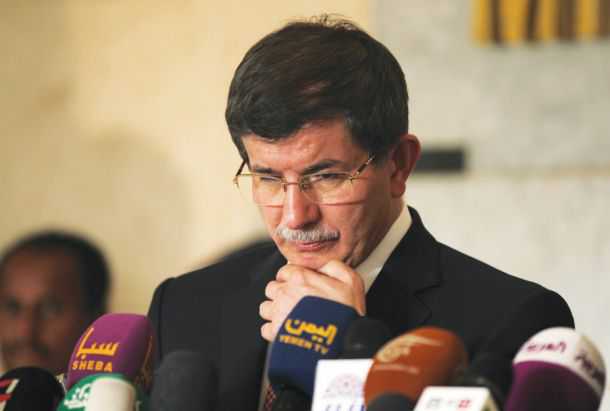
Supporters of Turkish EU membership often claim that this would prove that democracy and Islam are compatible. But it is the Turks themselves who have demolished this argument.
In a keynote speech by İbrahim Kalın, Prime Minister Erdoğan’s chief adviser, at the Istanbul Forum in October, Dr Kalın spoke of a post-Western political order in which the West does not have a monopoly over the democracy debate and the global human rights discourse. Furthermore, he claimed that the failure of secular humanism to secure freedom, rationality and equality has led to the search for a post-secular age.
In fact, the European model of secular democracy, politics and pluralism seems to have little traction in the Arab and larger Muslim world.
It is often asserted that the EU is a community of values, and after the start of accession talks with Turkey in October 2005 Enlargement Commissioner Olli Rehn emphasized that pluralism and free speech are basic values which cannot be compromised. However, Dr Kalın said there was “a mental gap” between Islamic and Western notions of what constitutes sacred, religious rights and freedom of expression. Consequently, Turkey has expanded the classical definition of foreign policy as advancing a state’s national interest to include value-based considerations. As Turkey now occupies a pivotal place in the new geopolitics, it accordingly seeks to pursue a value-based and principled foreign policy.
Dr Kalın failed to define these values, but as Turkish foreign policy is determined by internal dynamics, the answer can be found in a statement by Mustafa Özel, a driving force behind MÜSIAD, the Islamic Independent Industralists and Businessmen’s Association, in 1996. According to Özel, the preservation of Turkey’s domestic unity cannot be preserved through an ideology imported from the West but through a true connection with Islam, “the key source of our world view”.
Turkey’s foreign minister, Ahmet Davutoğlu, is well-known for a foreign policy which has been dubbed “neo-Ottoman” and builds on principles outlined in his key work, “Strategic Depth” from 2001. According to Professor Davutoğlu Turkey’s strategic depth rests on its geographical and historical depth and on engagement with the countries with which Turkey shares a common past and geography as well as shared interests and common ideals.
In a speech in Sarajevo in October 2009 Davutoğlu explained: “Like in the 16th Century, when the Ottoman Balkans were rising, we will once again make the Balkans, the Caucasus and the Middle East, together with Turkey, the centre of world politics in the future. That is the goal of Turkish foreign policy and we will achieve it.”
A new world order
In a speech made at an AKP congress in Konya in April the Foreign Minister was more specific. “On the historic march of our holy nation the AK Party signals the birth of a global power and the mission for a new world order (nizam-i âlem).
This is the centenary of our exit from the Middle East … whatever we lost between 1911 and 1923, whatever lands we withdrew from, from 2011 to 2023 we shall once again meet our brothers in those lands. This is a bounden historic mission.”
It should be noted that nizam-i âlem is an Ottoman concept, according to which the world order in all its aspects – political, social and economic – was ruled by religion (Islam).
A fortnight later Davutoğlu outlined his vision for the Middle East in the Turkish parliament. “A new Middle East is about to be born. We will be the owner, pioneer and servant of this new Middle East.” However, this vision has collided with reality.
Prime Minister Erdoğan’s cordial relationship with his “brother” Bashar al-Assad and the “long-term strategic partnerhip” between Turkey and Syria have turned to hostility with Turkey’s support of the Free Syrian Army against the Assad regime.
However, Turkey’s attempt to draw the UN Security Council into the conflict with support for a safe zone for Syrian refugees has failed. And NATO has been content to express its solidarity.
Iran’s support for Assad reflects the struggle for regional hegemony betweeen Turkey and Iran and threatens Turkey’s policy of “economic interpendence” with Iran. Around 90 percent of Iran’s exports to Turkey consists of hydrocarbons, as Iran has become Turkey’s largest supplier of crude oil and its second larger supplier of natural gas.
Turkey’s relations with Russia have also become strained after Turkish F-16s forced a Syrian airliner flying from Moscow to land in Ankara on suspicion that it was carrying arms. Another consequence of the conflict is that Turkey has had to abandon joint plans for a free trade zone with visa-free travel together with Syria, Lebanon and Jordan.
Erdoğan has offered to build a trilateral mechanism together with Iran to deal with the crisis but after the failure of the Sunni rebels to seize Aleppo the issue may be solved on the battlefield. Turkey’s nightmare is a Kurdish alliance between Turkey’s PKK and Syria’s PYD (Democratic Union Party) with support from Iraq’s Kurdistan Regional Government.
Together with the standoff between Turkey and Israel after the Mavi Marmara incident and Turkey’s occupation of northern Cyprus, Davutoğlu’s policy of “zero problems with neighbours” has seen its day. All that remains is to resolve the standoff with Europe, and Prime Minister Erdoğan has given the EU until 2023, when the Turkish Republic will celebrate its centenary, to make up its mind.
Robert Ellis is a regular commentator on Turkish affairs in the Danish and international press.

Leave a Reply